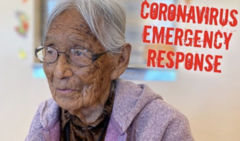- About
- Community
- Israel
-
Learn
- Our Schools
- Youth Department
- B'nai Mitzvah Program
-
Adult Learning
- Hazak
- Sayva: A New Approach to Positive Aging
- EFSHAR presents The Mystical Journey: A Month of Learning
- Talking Torah with Rabbi Lebovitz
- Weekly Torah Study with Rabbi Feinstein
- Thinking Aloud with Rabbi Nolan Lebovitz
- Discovery Circle
- VBS College of Jewish Studies
- Miller Introduction to Judaism (AJU) at VBS
- VBS Book Club
- Lunch and Learn
- The Inner Life of Men
- Adult B'nai Mitzvah Program
- OurSpace: The Artistic Spectrum of Jewish Learning for Adults
- Melton School
- Harold M. Schulweis Institute
- VBS YouTube Video Archives
- VBS Digital Media Projects
- Pray
- Volunteer
- Join
- Donate
Fundraiser to Provide Clean Water
06/30/2020 05:13:02 PM
| Author | |
| Date Added | |
| Automatically create summary | |
| Summary |
 This week we are proud to highlight the GoFundMe Campaign organized by VBS Member Steven Medof to provide clean water to the Navajo and Hopi Tribes.
This week we are proud to highlight the GoFundMe Campaign organized by VBS Member Steven Medof to provide clean water to the Navajo and Hopi Tribes.
Steven Medof grew up in Los Angeles. He says, like many of us, “I learned about Sitting Bull, played ‘Cowboys and Indians,’ celebrated Columbus Day, and was socialized into thinking that Native Americans were ‘savages.’” Steven is now in his 70s, but not much has changed in the way of popular education about Native Americans. In 2007, Steven decided to go back to school, attending UCLA for a Bachelor's degree in History. By chance, he found himself in a Sociology class taught by Professor Duane Champagne on American-Indian Studies. Steven was so inspired by Professor Champagne, and took a special interest in the topic. He realized that Native Americans aren’t a singular, static people of the past; there is a rainbow of 530 federally recognized tribes with their own languages, cultures, and customs.
Steven has always loved being a Jew and a member of VBS. He says his Jewish upbringing gave him a sense that helping other people is a mitzvah. As a longtime supporter of the Anti-Defamation League (ADL), Steven saw a gap in their work of fighting bigotry and bias against Native Americans. According to the FBI, American Indians experience more hate crimes per capita than any other minority in this country. He reached out to the ADL, who requested a study done to demonstrate how Native American communities could benefit from the educational programs that ADL has to offer. Steven enrolled as a Masters student, and under the guidance of Professor Shannon Speed, UCLA’s Director of American-Indian Studies and Amanda Susskind, ADL Regional Director (retired), an outline was developed for his work. He focused his thesis on demonstrating ongoing issues of bigotry and discrimination against Native Americans by the white majority.
Since the pandemic hit, Steven has been keeping a close eye on how COVID-19 has impacted Native Americans, specifically the Navajo and Hopi nations. The Navajo nation is the largest Native American nation, with about 200,000 residents in the reservation. One out of every three residents don’t have a tap or toilet according to the Navajo Water Project. As a result, the Navajo nation has surpassed New York and has the highest infection rate in the United States. Now more than ever, clean water for drinking as well as hand-washing is vital.
Seeing this, Steven decided to do some good. He reached out to Partnership with Native Americans, as well as Sparkletts Water, both of which have offices in Phoenix, Arizona, close to the Navajo and Hopi Nations. He worked with Sparkletts to get heavily discounted one gallon water jugs. These are delivered to Partnership with Native Americans and distributed to families on the reservation who are most in need. So far, Steven has raised over $5,000. To date, two water deliveries have been made, providing 3,500 gallons of water to the tribes.
If you’d like to support this work, Steven asks that you share and donate to the GoFundMe page. It’s also imperative that we learn more about Native American histories, and how we as non-indigenous Americans can uplift and support Indigenous causes. Here’s a media, book, and film list. I also recommend An Indigenous Peoples’ History of the United States. Steven strongly suggests “Silent Victims” by Barbara Perry.
Article was written by Nitzan Barlev.
*A note on language used: The terms “Native American,” “American-Indian,” and “Indigenous” were used in this article. Please note that there is no singularly agreed upon term, and that many First Nations or Indigenous Peoples prefer being referred to specifically as their tribe, as they are not a monolithic group.
Are you doing good? E-mail chesed@vbs.org and let us know about what you’re doing in response to this pandemic - we'd love to feature your efforts!
Mon, March 31 2025
2 Nisan 5785
Learn about VBS Chesed
Spread love!
We at VBS know that there are many paths to living your best Jewish life, including spending your time helping others. Whether responding to crisis, collecting resources for veterans, advocating for permanent solutions to homelessness, or supporting each other through connected conversations, VBS continues our legacy of pushing each of us to help each other. Chesed means loving kindness in Hebrew. It's a special kind of love – one that lifts spirits, mends fractures and changes the world for the better. Read our blog posts to learn about different highlighted initiatives and projects with our partners who help to build the world on Chesed. We invite you to learn more and join us in our efforts.




